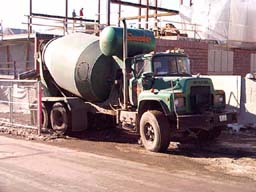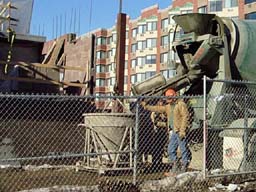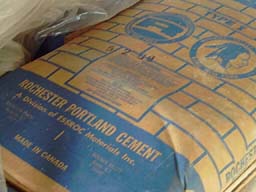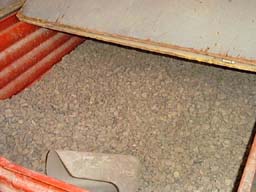|
|
What is concrete?
|
Concrete is not found in nature the way we would find aluminium,
nickel or iron. Concrete is formed from combining water, a special cement and rock:
PORTLAND CEMENT + H2O + ROCK = HARDENED CONCRETE + ENERGY(HEAT)
|
 |
 |
A common mistake people make is to use the words cement and concrete interchangably.
It is important to remember that cement is only a component of concrete and
concrete is the structural material. The cement used in concrete is not used
as a building material because it would be too expensive and not as strong as
concrete. So when you see a parking garage, a driveway, a sidewalk or a road
remember it is made of concrete, not cement. And, by the way, that funny looking
truck is a concrete mixer, not a cement mixer! But, if cement is not concrete,
then what is it?
|
|
Cement is a general name for a material that binds other materials together.
Yes, it is another name for glue.
The structural concrete used in bridges and dams and other
types of road surfaces is made from Portland
cement (#). |
 |
Adding water to the dry cement starts a chemical reaction
(hydration).
While the mixture of cement, water, and rock is fluid, it can be poured into
molds (called formwork) of arbitrary shape. This is a valuable property of
concrete which allows us to build dams with the many different shapes which
you saw in the history of dams.
The compound gradually hardens into the desired final shape.
The water/cement ratio (w/c) of the mixture has the most control over
the final properties of the concrete.
|
 |
The other important component for strength is the aggregate, the rock that is being bound
by the hardened cement. To make very strong concrete requires a low w/c and strong
aggregate. There might be thousands or millions of tons of cement and
aggregate in a large dam. Finding the aggregate for the dam, and
transporting it and the cement to the dam site are important societal factors.
|
|
Here's a chance to make your own concrete.
There are many different formulas to make concrete.
Which combination of water, cement, and aggregate gives the strongest
concrete? If an engineer designs a dam assuming a certain strength concrete,
how does she/he know that the concrete used was the strength wanted? These
questions and more are answered by testing the concrete.
But before we can break it, we need to make it, so read the recipe, get down to your local
building supply store, and engineer some concrete!
What can we learn about concrete
from testing?
|


|




